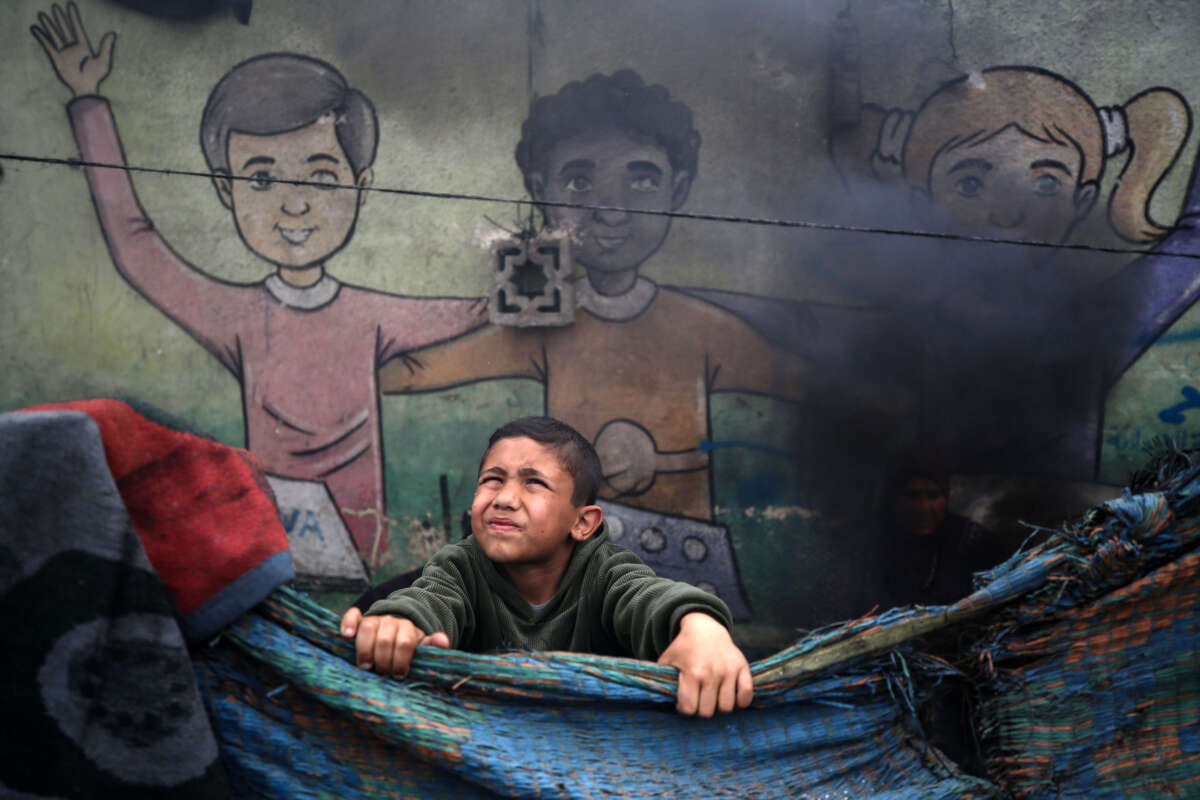Honest, paywall-free news is rare. Please support our boldly independent journalism with a donation of any size.
More than 10,000 students, teachers, and academics were killed or harmed in thousands of attacks on education in 2022 and 2023, according to research published Thursday amid Israel’s ongoing assault on the Gaza Strip, which has seen its schools and universities decimated by the U.S.-backed Israeli bombing campaign.
The Global Coalition to Protect Education From Attack (GCPEA) identified roughly 6,000 attacks on education in 2022 and 2023, a 10% increase compared to the two preceding years. The highest number of attacks took place in occupied Palestine, Ukraine, the Democratic Republic of the Congo, and Myanmar, and explosive weapons — including rockets and landmines — were involved in about a third of the attacks.
“In places like Gaza, in addition to the horrific loss of life, education itself is under attack,” Lisa Chung Bender, GCPEA’s executive director, said in a statement. “School and university systems have been shut down, and in some cases completely destroyed. This will have long-term consequences on social and economic recovery, as the very infrastructure needed for peace and stability have been targeted.”
GCPEA researchers estimate that more than 475 attacks on schools took place in Palestine last year, surging after Israel launched its large-scale assault on Gaza following the deadly Hamas-led attack on October 7. Israeli forces have damaged or destroyed every university in the Gaza Strip as part of what United Nations experts have described as a “systemic obliteration of education.”
In addition to attacks on education infrastructure, the new report shows that targeted attacks on students, teachers, and prominent academics have become more frequent worldwide in recent years.
“More than 10,000 students and educators were reportedly killed, injured, abducted, arrested, or otherwise harmed by attacks on education in 2022 and 2023,” GCPEA’s new report notes. “The number of students, teachers, professors, and education staff killed or injured increased by over 10% compared to 2020 and 2021, the period covered in the last Education Under Attack report.”
Jerome Marston, a senior researcher at GCPEA, said that “on average, eight attacks on education were recorded daily over the past two years, meaning a startling number of students were unable to follow their dreams of learning, or develop the skills that an education promises.”
“Schools should be safe havens, not targets,” said Marston.
The new report stresses that growing attacks on education have taken place “against a backdrop of increasing conflict” and a worsening climate emergency, which GCPEA said “may be linked to attacks on education” such as the “lootings of school canteens” in areas impacted by severe hunger.
“In late March 2022, a suspected armed group allegedly looted a school canteen in Komangou village, Gourma province, Est Region, Burkina Faso, on two consecutive days, as reported by a local media outlet,” the report observes. “On November 16, 2022, a suspected armed group allegedly attacked a school and looted its canteen in Fatakara village, Timbuktu region, Mali.”
Additionally, the report makes a preliminary connection between climate-fueled extreme weather events and attacks on education.
“For instance, in the Philippines, climate change has contributed to more intense typhoons, affecting in particular the Bangsamoro Autonomous Region in Muslim Mindanao that has faced decades of protracted armed conflict,” the report notes. “The U.N. reported that an armed group in the region attacked a school being used as shelter by people displaced by emergencies while state security forces were nearby for disaster-relief efforts.”
GCPEA calls on all parties to armed conflicts across the globe to “immediately cease attacks on education” and urges governments to endorse the Safe Schools Declaration, an international effort to protect education during war.
Neither the U.S. nor Israel have backed the declaration.
A terrifying moment. We appeal for your support.
In the last weeks, we have witnessed an authoritarian assault on communities in Minnesota and across the nation.
The need for truthful, grassroots reporting is urgent at this cataclysmic historical moment. Yet, Trump-aligned billionaires and other allies have taken over many legacy media outlets — the culmination of a decades-long campaign to place control of the narrative into the hands of the political right.
We refuse to let Trump’s blatant propaganda machine go unchecked. Untethered to corporate ownership or advertisers, Truthout remains fearless in our reporting and our determination to use journalism as a tool for justice.
But we need your help just to fund our basic expenses. Over 80 percent of Truthout’s funding comes from small individual donations from our community of readers, and over a third of our total budget is supported by recurring monthly donors.
Truthout’s fundraiser ended last night, and we fell just short of our goal. But your support still matters immensely. Whether you can make a small monthly donation or a larger one-time gift, Truthout only works with your help.
